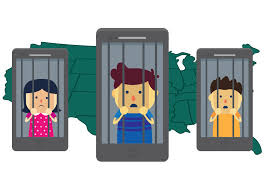The Trojan Horse might have been the world’s first mobile spying device. Today things have gotten smaller and more personal.
As the media report on college campus encampments popping up they neglect the Trojan Horse in their midst. Phones are an essential part in the story when you imagine how people of different stripes come to share their messaging, organize, and set a place and time. The fact that they might be doing this publicly is opaque. Phone and Protest is the New Trojan Horse.
Breadcrumb Trails:
Before smartphones, there was another method used to track people who organized. The license plates of parked vehicles were scanned. A search of the numbers through a motor vehicle database then identifies the registered owner and home address. Of course, organizers were missed if they took the bus or got dropped off. A smartphone is different because almost everyone has one- even those who walk in.
In a descriptive zine, SproutDistro details out how smartphones can be hacked to identify the identify of participants. It is easy for law enforcement officials to set up a temporary cell tower that spoofs phones to connect to it, not to the nearest telco tower. These covert listening posts collect the registration number of a phone from SIM cards and possibly other unique identifiers.
On the Campus:
So, with contemporary issues in view, these elements can be useful for campus administrators and campus security. They can sort out, from a distance, whether people participating in the encampment are enrolled students, community members, or professional agitators. Universities can also cross -check registration records to determine whether a student will forfeit the credits need to graduate should they encamp through May or June.
Spyware on phones has a long history, beginning with wiretapping from central offices. Companies, like Apple, say that they are proactive. They introduced Lockdown mode about two years ago, in reaction to Pegasus Spyware used in the Middle East and elsewhere. Apparently, Pegasus infected iPhones by sending a text via iMessage. Pegasus breached the user’s device and iCloud account without their interaction or knowledge. In spyware parlance it’s called entry by “zero clicks.” Lockdown is not as draconian as the Apple name suggests. When activated in settings there are no previews in text messages, no shared photos or FaceTime without known contacts, and a restriction on opening new files and attachments.
Really Locked Down?
Android phones don’t have the same feature. What they call Lockdown mode ceases to make the biometrics work. An Android lockdown disables the fingerprint or face scanner that unlocks the device, so if the phone gets into nefarious hands, it will stay locked without access to the PIN code. it’s more difficult for a third party to hack into the physical device. But it does not prevent the phone being spoofed by a make-shift cell tower.
One of the ironies of current times is that smart students might take all the right steps to lockdown their device, whether Android or Apple. But, they may overlook the real security issue because of their personal attachment to the phone and their social needs. Like the Trojan Horse that was rolled into the city of Troy, we are told that TikTok and other social media are very good at deciphering a lot about our geolocation and more. We are not completely sure what they know about us, but it is more than we know about them.

